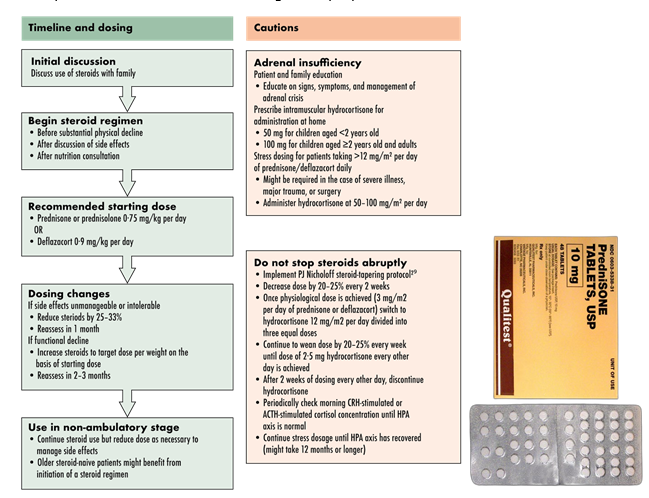A patient is taking high doses of prednisone to control the symptoms of acute exacerbation of systemic lupus erythematosus. When teaching the patient about the use of prednisone, which information is important for the nurse to include?
Check your temperature daily because prednisone can hide signs of an infection.
Do not stop taking the prednisone suddenly, it should be decreased gradually.
Call the doctor if you experience any mood alterations with the prednisone.
Weigh yourself daily to monitor for weight gain caused by water or increased fat.
The Correct Answer is B
Sudden discontinuation of prednisone can result in adrenal insufficiency and can lead to life-threatening complications. The nurse should also instruct the patient to report any symptoms of an infection, such as fever, to the doctor promptly, as prednisone can mask signs of an infection.
Monitoring for mood alterations and daily weight measurement are also important aspects of care, but they are not as crucial as the need to gradually taper off the medication.
Nursing Test Bank
Naxlex Comprehensive Predictor Exams
Related Questions
Correct Answer is C
Explanation
The correct answer is choicec. The cobalamin injections will prevent me from becoming anemic.
Choice A rationale:
Cobalamin (B12) injections do not increase hydrochloric acid production in the stomach.Chronic atrophic gastritis often leads to decreased production of hydrochloric acid due to the loss of parietal cells, but B12 injections do not reverse this condition.
Choice B rationale:
The need for cobalamin injections is typically lifelong in patients with chronic atrophic gastritis because the condition leads to a permanent loss of intrinsic factor, which is necessary for B12 absorption. The injections are not just until the stomach heals.
Choice C rationale:
Chronic atrophic gastritis can lead to vitamin B12 deficiency due to the loss of intrinsic factor, which is essential for B12 absorption.This deficiency can cause pernicious anemia, and B12 injections are necessary to prevent this condition.
Choice D rationale:
While chronic atrophic gastritis does increase the risk of stomach cancer, B12 injections are not specifically aimed at reducing this risk.The primary purpose of B12 injections is to prevent anemia.
Correct Answer is C
Explanation
Before administering any medication, the nurse should confirm the potassium level to ensure that it is still elevated and needs to be treated. Potassium levels can fluctuate, so repeating the test will ensure that the client receives the appropriate treatment.
Options (a) Withhold the medication and (b) Administering a hypertonic solution may be appropriate interventions depending on the client's condition, but confirming the potassium level is the first step.
Option (d) Monitoring for paresthesia is important but not the first action that the nurse should take.
Whether you are a student looking to ace your exams or a practicing nurse seeking to enhance your expertise , our nursing education contents will empower you with the confidence and competence to make a difference in the lives of patients and become a respected leader in the healthcare field.
Visit Naxlex, invest in your future and unlock endless possibilities with our unparalleled nursing education contents today
Report Wrong Answer on the Current Question
Do you disagree with the answer? If yes, what is your expected answer? Explain.
Kindly be descriptive with the issue you are facing.

